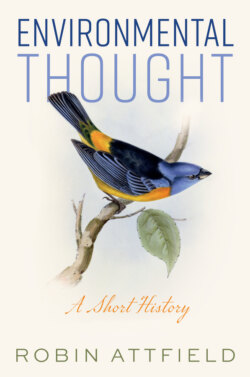Читать книгу Environmental Thought - Robin Attfield - Страница 7
1 Pre-modern Attitudes and Influences
ОглавлениеThis chapter concerns attitudes to nature in the period before 1500 CE. With the exception of one allusion to ancient China and one to ancient India, it is concerned with Western cultures, broadly enough interpreted to include the rise of Islam and its spread into much of the Middle East, and beyond that to the lands once conquered by Alexander, such as Iran and Afghanistan. Yet it primarily focuses on the Greeks and the Romans, on the Old and New Testaments, on early Christianity and on Europe in the Middle Ages. For these were the periods and the cultures from which many more recent attitudes have derived, as becomes clear in Chapter 2, which depicts the early modern period of Europe.
While the predominant ancient stance was that humanity can and should be in control of nature, it was from the Greeks, in particular, that we have received, on the one hand, belief in human stewardship of the natural world (a belief to which Christianity later contributed: see Chapter 2), and, on the other, belief in the world as a living being, an ancient theme echoed many centuries later in James Lovelock’s theory of Gaia (see Chapter 8). Greeks such as Empedocles and Romans such as Lucretius were among early adherents of speculative versions of the theory of evolution by natural selection, more recently supported with empirical evidence and a different conceptual scheme by Charles Darwin (see Chapter 3); this theory has in turn fostered a new ecological awareness (see Chapter 4 and onwards).
Thus, while some readers may prefer to turn to the chapters about Darwin and environmental thought in the subsequent period, it may be rewarding to review first the beliefs and theories of the ancient and medieval worlds. These are the focus of the current chapter.
